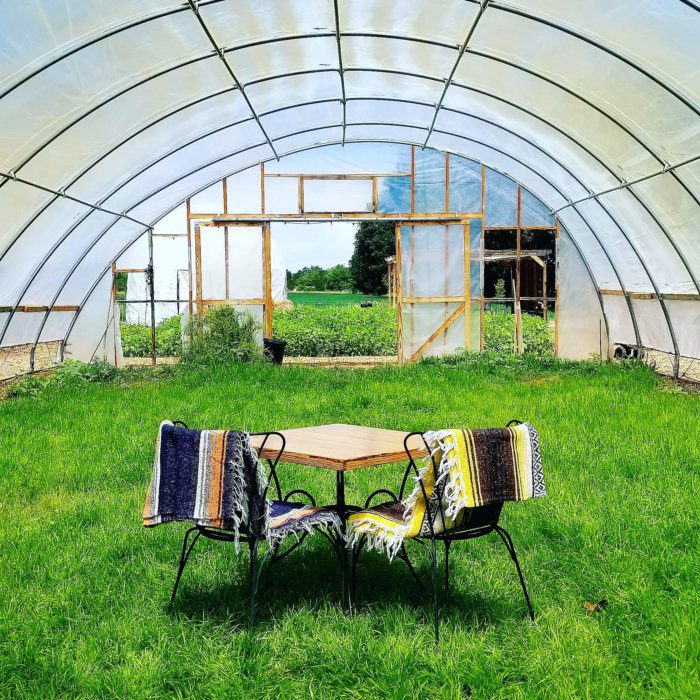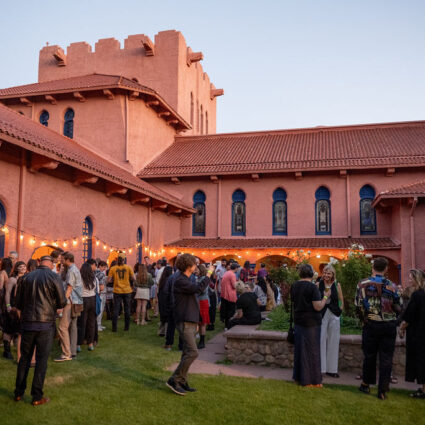“Uncharted” is a new interview series created in light of the COVID-19 pandemic. We’re talking to people in the New Mexico arts world and beyond to see how the community is navigating this unprecedented health crisis. This interview has been edited for length and clarity.
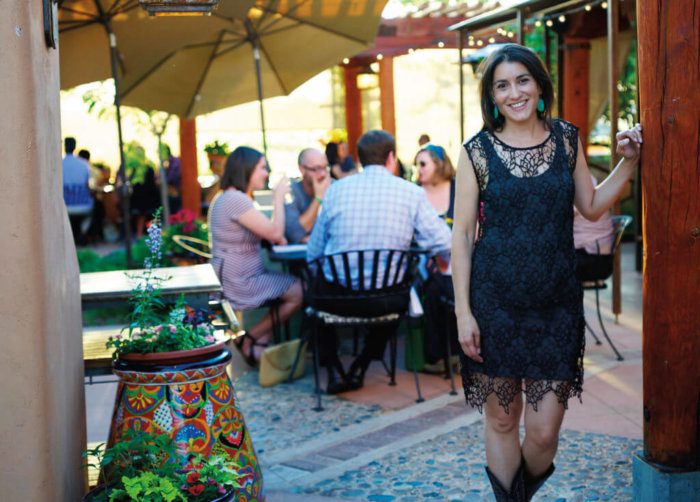
Farm & Table is an Albuquerque restaurant with a strong ethos grounded in local food and sustainable practices. Like many in the food and beverage industry, Farm & Table was heavily affected by the COVID-19 restrictions. The week we spoke, the restaurant was fully reopening to the public for the first time since March. We spoke with Cherie Montoya, owner of Farm & Table.
Daisy Geoffrey: How are you doing now as you start to reopen?
Cherie Montoya: We had a soft opening last week, so we only have a few days under our belt. It’s really just about survival. I think for restaurants, it’s a different type of business—it’s already a tight margin as it is. I think the way restaurants were hit is unique. Let’s see if we can not have to close down, basically.
With a tight margin as it is, how do you approach opening at a limited capacity?
It’s a balancing act. We’re lucky—we have a gorgeous patio, a farm, a huge local following, and a really good reputation. If it’s still hard for us, I can’t imagine how hard it is for others. What makes it difficult for us is we don’t buy cheap ingredients— it’s an expensive operation. We work with farmers, local growers, and local ranchers, so we probably pay 4-6 times more than most restaurants do just for the basic ingredients. And we’re chef-driven, so we’re paying skilled artisans, and we pay people well. When we don’t have anything coming in, there’s no way we can survive.
In a lot of these situations, the decisions are being made for us, we just have to have some kind of grace in the way we pivot towards our new future.
How has the situation affected your long-term business strategy?
We don’t even know what that looks like. We‘re uncertain and we don’t know where we’re heading. I do know that if this happens again, I’m probably going to close up the restaurant for a longer time and take a hiatus. We can’t continue to grasp at straws. I think closing right away is probably really smart.
I’m a complete optimist. I’m always thinking about how there are so many opportunities, that we can do this, we can pull together—that’s my mantra and the way we’ve structured our philosophy. We’re a very agile business. Now in retrospect, I feel like I would have done some things differently. When this first happened, I said, “I’m going to take care of my employees. I’m not going to lay them off right away, I’m going to dip into my savings and hold onto my employees, pay for another week of payroll, and we’re going to work on a plan as a team. Conscientiously, intentionally have a plan.” Now I understand that was a harmful decision for the bottom line because at the end of the day all my employees ended up absolutely fine. As soon as they were laid off they got unemployment. But I felt it was unconscionable to send my employees away, to say, “We are closing today, you don’t have a job.” It didn’t feel like the right thing to do.
I know a lot of business owners probably went through the same thing. If I hadn’t done that, it would have been an extra $25 thousand I could have put into reopening. My payroll, even with a skeleton crew, is really expensive. I have an executive chef, a sous chef, a pastry chef—I have real artisans.
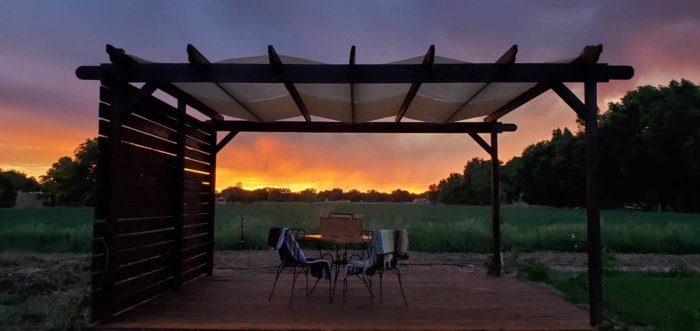
In retrospect, it’s easy to know what to do, but it was all so unclear in the beginning.
We thought it was just going to be a three-week closure. Immediately we pivoted to do takeout and tried not to lose all of our inventory. We had already done all of our ordering for the week, so we had about five thousand dollars worth in food, two thousand worth in wine, and payroll was already in motion. The food was going to go bad, so we started a takeout campaign, and it was popular but unsustainable.
There’s no way for Farm & Table to survive on takeout. If I were to let go of all my staff and hire just a line cook to make to-go orders then it would be different, but to maintain our integrity and keep my core staff, it wasn’t sustainable. We had to go to the next step, which was laying everybody off completely.
I applied for the PPP, and I was accepted in the first round, but that was a blessing and a curse. I thought, that’s amazing, this can save us. But there were no real guidelines that had been written and approved, so as time went on the rules started to become evident. And basically the rules are, when you get funded you have to use the money starting that day and use it in eight weeks. So my PPP ran out before we even reopened. This is not just my story. This is all restaurants’ stories. It’s not a rosy picture.
My partner Danny Lopez and I hunkered down and started working on our farm really intensely. We planted over 200 trees, four types of cover-crop, and dug some irrigation ditches. My employees are so amazing—I had a few that volunteered to help. We did our best to be distracted by really hard work, not knowing when the restrictions were going to be lifted. We didn’t have much money to do it, but we did have a lot of time, and love, and attention.
This place is like a dream—you walk out onto the farm and you forget you’re in New Mexico. We created alternative, amazing dining experiences on the farm. We built a beautiful new deck, and we have a greenhouse, and then we have another deck set up. So we have these gorgeous exclusive spaces that people can rent, get a takeout picnic, and have a totally unique experience that’s private and not around a lot of other people.
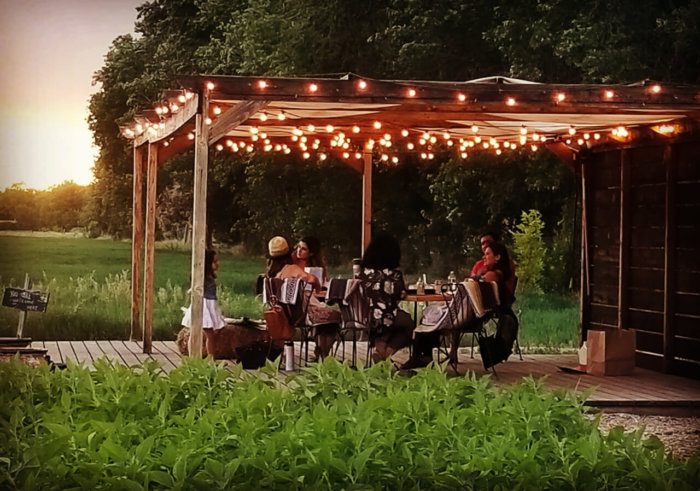
It’s moving to hear the way you describe your staff, it really sounds like it’s a family over there.
It really is. The whole unemployment thing has been such an interesting, moral conundrum. I feel like unemployment has been wonderful for people because they’re making good money, and at the same time when you talk to restaurant owners, most employees don’t want to come back to work because they’re going to be making less. I didn’t know what to expect when I asked my employees to come back. It’s overwhelming to me that people are making the decision to come back to work when they could stay home, and make more money. I feel blessed.
I know you’re supportive of and reliant upon local food systems, do you have any insight on how they’ve been affected by the pandemic?
Everything was turned on its head immediately. We buy most of our ingredients from local farmers, growers, and ranchers. Every week we’ll hear from farmers and they’ll give us an update on what’s available, and we’ll order what we need. These farmers are used to their market being there for them, but when all the restaurants closed down, they all stopped ordering from farmers, including us.
In a lot of these situations, the decisions are being made for us, we just have to have some kind of grace in the way we pivot towards our new future. Most of the farmers had to pivot as well, and what they did is created CSAs, selling directly to individuals and to stores. But then there was the second problem, of when we started to open back up, they didn’t have anything available because they’ve already committed out to their new customers. That has been another layer of okay, what do we do? We’ve had to scramble for more farmers. We’re getting back into the swing of things, but this pandemic really stressed all of these systems that had been working so well.
It’s imperative for people, especially business owners, to reevaluate what we put our time and attention to, and to rethink the decisions that we make.
What has the community support been like?
It’s been so amazing. I mentioned that we planted 200 trees—I decided to do a campaign that called for our community to sponsor a tree, now most of them are sponsored. People bought thousands in gift certificates. The love is there. We did a soft opening last Wednesday, and we’ve been booked every single night. People are excited about coming back out into the world. Our patio is really nice and spacious, there’s plenty of space between the tables already.
Is there anything that’s inspiring you or giving you hope as you start to move forward?
The best thing that came out of this for us was a big dose of humility. We were already thankful and grateful for this amazing restaurant and the customers we have, but even more so just being appreciative of the little things that we have. And to recognize the things we take for granted or take advantage of. You get on autopilot as a person or a business owner, and get comfortable with the things that are available to us. But, knowing that we’re all in the same place, it’s like, how can I shift my paradigm? How can I think about things differently? How can I utilize my resources more carefully, and how do I recognize these things as precious and not just things I can throw away? It’s imperative for people, especially business owners, to reevaluate what we put our time and attention to, and to rethink the decisions that we make. I want to take these lessons with me and move forward. Be more conscientious, careful, and even safe. That has been the best lesson: heightened awareness.
